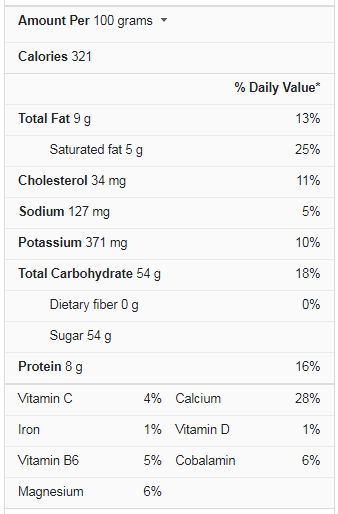Condensed milk is a common ingredient in desserts, candies, and creamy beverages. It is made by condensing cow’s milk by removing the water, then sweetening it with sugar (hence the name), resulting in a very sweet, thick mixture with an off-white color. Condensed milk comes in cans, is shelf-stable, and is usually found in the supermarket’s baking section.
Condensed milk is a viscous, thick, creamy liquid made by removing most of the water from milk. To extend the shelf life of this milk, it is sweetened with sugar and stored in sealed cans. Its sweet and creamy flavor is frequently used to add richness and flavor to desserts.
What are the Condensed Milk Nutrition Facts?
What is Exactly Condensed Milk?
Sweetened condensed milk (also known as condensed milk) is a product made by gently heating whole milk until about 60% of the water has evaporated, then adding sugar to a 45 percent (by weight) ratio of the remaining milk. The result is a thick, sweet, sticky mixture used in various baked goods, candies, desserts, drinks, and even marinades.
Some of the natural sugars in the milk caramelize during the evaporation process, adding a new dimension of flavor. The heat pasteurizes the milk, and the addition of sugar keeps it shelf-stable by inhibiting the growth of bacteria that cause spoilage and food poisoning. Condensed milk is like a can of liquid candy. It has a sweet, rich, milky, caramelized flavor and thick, syrupy consistency.
What are the Health Benefits of Condensed Milk?
People who are calorie conscious may think twice about using condensed milk regularly because it is high in calories. However, some of its potential benefits are not negated when used in moderation.
1. Rich in Calcium
Calcium is necessary for your muscles, bones, and teeth properly functioning. According to the National Institute of Health (NIH), the recommended daily average (RDA) calcium intake for adults is 1300 mg. A 100g serving of condensed milk provides nearly 20% of the daily recommended average. In addition to improving bone health, calcium has been shown in studies to help with hypertension during pregnancy and osteoporosis. It also aids in the re-establishment of calcium levels in postpartum women.
2. Ideal for Gaining Weight
Eating a high-calorie, protein-rich diet can help people who healthily are underweight gain weight. According to research, this type of diet may aid in the improvement of overall body mass index. Condensed milk contains 321 calories and 8 grams of protein per 100 grams, so adding it to your diet in moderation can help you healthily gain weight.
Using a teaspoon of sweetened condensed milk instead of sugar to sweeten your breakfast cereal or oatmeal is a healthier option, as the former is more nutritious. Compared to condensed milk, sugar only contains empty calories, whereas condensed milk contains other nutrients such as protein, calcium, and phosphorus.
3. It May have Anti-Inflammatory and Anti-Aging Properties.
Aside from being high in protein, sweetened condensed milk also contains trace amounts of riboflavin, an anti-inflammatory vitamin. By reducing oxidative stress caused by free radicals, riboflavin may also help to reduce the signs of aging. There is limited information about the health benefits of condensed milk because it is typically used as a dessert ingredient rather than consumed alone or as a supplement. Let’s look at some drawbacks of drinking sweetened condensed milk in the next section.
Some Health Risks
While there are some health benefits to drinking condensed milk, it also has drawbacks.
1. Not Ideal for Weight Loss
Condensed milk contains 321 calories per 100g, which is a significant amount of calories. If you’re trying to lose weight or stick to a calorie-restricted diet, condensed milk should be avoided.
2. Bad for Diabetes and Heart Patients
In addition to being high in calories, sweetened condensed milk is high in saturated fat and harmful to people with diabetes and heart problems. According to studies, a high-saturated-fat diet can cause an increase in LDL cholesterol and insulin levels. A high LDL cholesterol level raises the risk of cardiovascular problems. It can also lead to insulin resistance, which prevents your body from breaking down sugar, resulting in type 2 diabetes.
3. Not Ideal for Those with Lactose Intolerance
Because sweetened condensed milk is a dairy product, it should be avoided if you have a dairy allergy or are lactose intolerant. Now that you’re aware of the advantages and disadvantages of consuming sweetened condensed milk let’s look at how you can incorporate it into your diet.
Is Condensed Milk Good in Coffee?
Condensed milk with coffee is a fantastic way to sweeten your morning coffee. This easy recipe can be served hot or iced, and it’s a terrific way to spice up your morning coffee. The most common base for homemade coffee creamers is sweetened condensed milk. It’s easy to see why; the sugar used to sweeten it also serves as a preservative, allowing it to last longer. Condensed milk is also more satisfying to most coffee lovers, both creaminess and taste.
How to Use it?
It’s simple to incorporate sweetened condensed milk into your diet, and here are a few creative ways to incorporate it into your diet.
- Add a teaspoon or two of sweetened condensed milk to your coffee or tea for a rich, creamy, and thick texture. It’s one of the easiest ways to make iced tea in the Thai style at home.
- If you’re in the mood for a decadent homemade fruit salad, sweetened condensed milk is the way. Drizzle a generous amount of this delectable goodness over your fruit salad to add oomph and depth to the flavor.
- A teaspoon or two of sweetened condensed milk will enhance the flavor of a delicious, steaming cup of hot chocolate (cocoa). Because condensed milk is naturally sweet, you may want to cut back on the sugar you normally use.
Condensed Milk vs. Evaporated Milk
Evaporated milk, a similar product sold in a can with a similar size and shape, is frequently confused with sweetened condensed milk. Both are evaporated milk, but sweetened condensed milk has sugar added, whereas evaporated milk doesn’t. Condensed milk is essentially the sweetened version of evaporated milk.
Because condensed milk contains a significant amount of sugar, it alters the product’s flavor and consistency. Condensed milk is significantly thicker than evaporated milk due to the added sugar, and condensed milk is more syrupy than evaporated milk, which is creamy. Some recipes call for both types of canned milk, such as caramel flan, but substituting one for the other is not recommended.
What are the Substitutes for Condensed Milk?
Although there is no perfect store-bought substitute for sweetened condensed milk, cream of coconut, which is coconut cream with sugar added, can be used in a pinch. Sweetened condensed coconut milk is also available in the natural foods section of the supermarket.
If you don’t want to use coconut flavor, you can make your own sweetened condensed milk with whole milk, evaporated milk, or instant nonfat dry milk powder; non-dairy milk can also be used for a vegan version. The basic recipe is to boil the milk product with the sugar, then reduce and thicken until reduced.
Where to Buy Condensed Milk?
Condensed milk comes in small cans and is found in the supermarket’s baking section. It’s usually kept in the same aisle as its unsweetened counterpart, evaporated milk, which comes in similar-looking cans from the same companies, so read the label carefully. Condensed milk will specify that it is “sweetened” and will use the term “condensed” rather than “evaporated.” On the other hand, if the word “evaporated” appears on the label, it isn’t the sweet version.
Sweetened condensed milk is extremely shelf-stable because it comes in a can. They can be kept in the pantry for years if it is not opened. However, the unused portion of the can should be stored in a new container in the refrigerator for about two weeks after being opened.
California Farms Organic Condensed Sweetened Milk
Features:
- Santini Foods Condensed Sweetened Milk, 14 oz
- Organic Milk and Organic Sugar Only
- No pesticides, chemical fertilizers, preservatives, or synthetic hormones and antibiotics
- Allows thickening without heating when combined with acidic products like fruit juices
How to Store Sweetened Condensed Milk?
Storing condensed milk is the same as storing its unsweetened equivalent, evaporated milk. Alternatively, you can keep it the same way you would any other canned food.
Keep the can in a cool, dry place away from sunlight and heat sources as long as it is unopened. The absence of moisture in the area helps prevent the can from rusting. Being in an area where the temperature does not fluctuate considerably aids in the long-term preservation of the greatest quality.
Once you open the can, keep the sweetened condensed milk always refrigerated and sealed tightly. Since sealing an opened can on its own is impossible, there are a few options:
- Pour the leftovers into an airtight container or resealable jar
- Use a plastic wrap and a rubber band for a temporary seal
Although the former is preferable, the latter will suffice for a few days. It’s not a good idea to keep milk in an open can. And the liquid will absorb any odors from the fridge, and you may end up with condensed milk that smells like sausage.
When it comes to homemade sweetened condensed milk, you should always store it in the fridge. That is, of course, after you cool it down after cooking. The same applies to any recipes where you use condensed milk or caramel.
Conclusion
To summarize, condensed milk is made by removing nearly all the water from milk and then sweetening it with sugar. This creamy, rich liquid is used to make a variety of desserts and sweet treats. Evaporated milk is the unsweetened version of this. Evaporated milk has fewer calories and sugar than sweetened condensed milk and can be used as a direct replacement for condensed milk. You can add it to your oatmeal, coffee, or tea to incorporate it into your diet, and you can eat it right away.
Protein and minerals like calcium, potassium, and phosphorus in condensed milk are abundant, and these minerals are beneficial to bone health and overall health. Those looking to lose weight should avoid this high-calorie milk option, and it is also unsuitable for those with diabetes or heart disease due to its high carb content.





